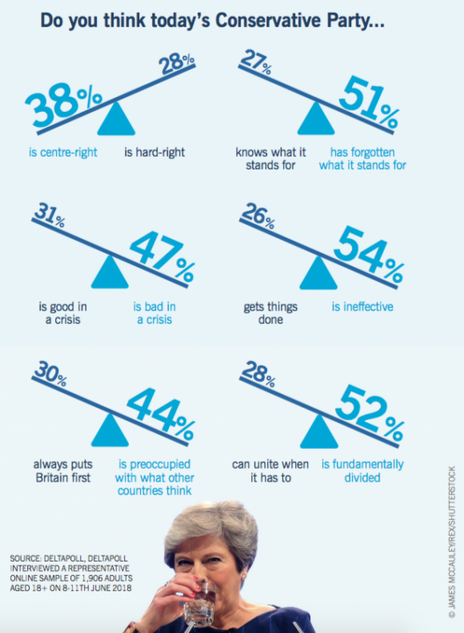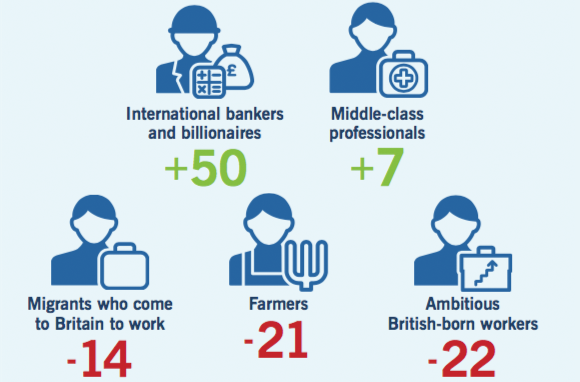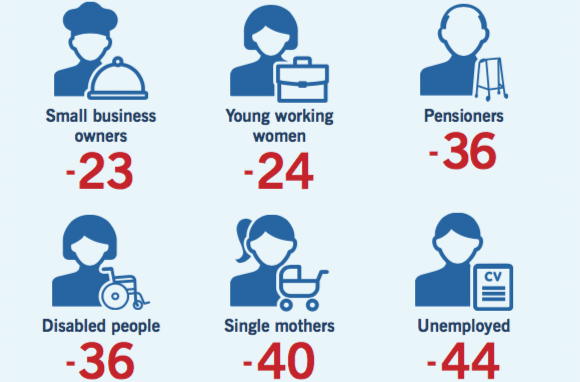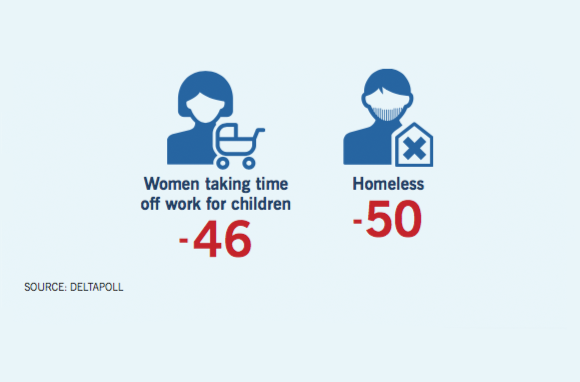The perils of Brexit for the Conservatives are thrown into sharp relief by an exclusive Deltapoll survey for Prospect, which finds that it is no longer regarded as “good in a crisis”—and is seen as being more concerned with the interests of bankers and billionaires, rather than anyone else.
The party has often been charged with being heartless, but May faces the thorny dilemmas that Brexit poses without being thought to possess the virtue that the Tories have often enjoyed in the eyes of the voters: hard-headed competence.
Twice as many voters, 54 per cent, believe the party is ineffective as the 26 per cent who believe it “gets things done.”
And by a 16 point margin, they rate it as “bad in a crisis”—which strongly suggests Brexit is taking its toll.
When pollsters ICM asked the same “crisis” question about David Cameron personally, as unemployment was peaking in late 2011, he achieved a net +10.
Vulnerable to populists?
The party may be relieved that the voters as a whole regard it as centre-right (38 per cent), not hard right (28 per cent), but this is not true among Remainers: they are narrowly inclined (by 38 to 36 per cent) to rate the Tories as hard right.It also looks vulnerable to populist attack: 44 per cent think it is “internationalist, and preoccupied with what other governments think” with a mere 30 per cent believing it is “patriotic, always putting Britain first.”
A divided party
Amid the Brexit bickering, the party has been looking badly divided.But what’s more disturbing for it is that the voters do not regard this as a passing problem, but a permanent condition: only 28 per cent think it can still “unite when it has to” against a majority of 52 per cent who regard it as “fundamentally divided.”
At the same time, voters believe that the Conservatives have forgotten what they stand for: 51 per cent take that view, as against just 27 per cent who disagree.
Martin Boon, the long-standing pollster who recently co-founded Deltapoll commented: “Just like any commercial brand, a political party needs to explain what it is for, what values it has, what it seeks to do.”

“If the Conservatives know the answers to these questions, they sure aren’t getting them across. When a majority thinks you’ve forgotten what you stand for, you’re in trouble.”
Who do you stand for?
Things don’t get any better for the party when the public is asked who they stand for.The British Conservatives have, historically, been a centre-right success story because they’ve cultivated support beyond the elite: small savers, rural communities and workers with ambitions to better themselves.
But how far is that true today?
Deltapoll asked voters whether the Tories were, or were not, concerned with “the interests” of various groups.



The graphics show the difference between the two scores. For example, 45 per cent thought they were concerned about “professionals such as headteachers, GPs and accountants,” 38 per cent thought they weren’t, to give the net +7 points shown.
The scores are overwhelmingly negative.
Some, like the homeless (-50), the unemployed (-44), single mothers and disabled people (-36) confirm a heartless image.
Less familiar, and more worrying, is a perception that the party doesn’t give a fig for traditional core supporters like farmers (-21) and small businessmen (-23).
They might not be surprised to find few see them as interested in young working women (-24), but perceived contempt for women who take time off to raise children (-46) will alarm Tory traditionalists who see themselves as the party of the family.
With nationalism in the air, the party may also be especially disturbed to find that it is seen as even less interested in ambitious British-born workers (-22) than migrants who come to work (-14).
At the same time, a strong perceived concern with the interests of bankers and billionaires (+50) suggests vulnerability to populist attack.
The biggest question
Boon added: “‘who you’re for’ is the biggest question. So it is troubling that the Tories are now only seen as the party for billionaires and, at a push, middle-class professionals because there aren’t enough votes in the billionaire clique. These numbers suggest that that Labour attack about privileged 'few' versus the 'many' could hit home.”Age is increasingly seen as the crucial dividing line in politics, and the growing army of pensioners seen as the Conservatives’ strongest suit. But again, the poll offers scant comfort.
Across the population as a whole, the Tories score rate poorly, a net negative of -36, in being concerned with pensioners’ interests. Even worse, is that this sinks even lower, to a score of -43, among the over-65s themselves.
Next: do the Tories have a problem in the marginals on their hands?












